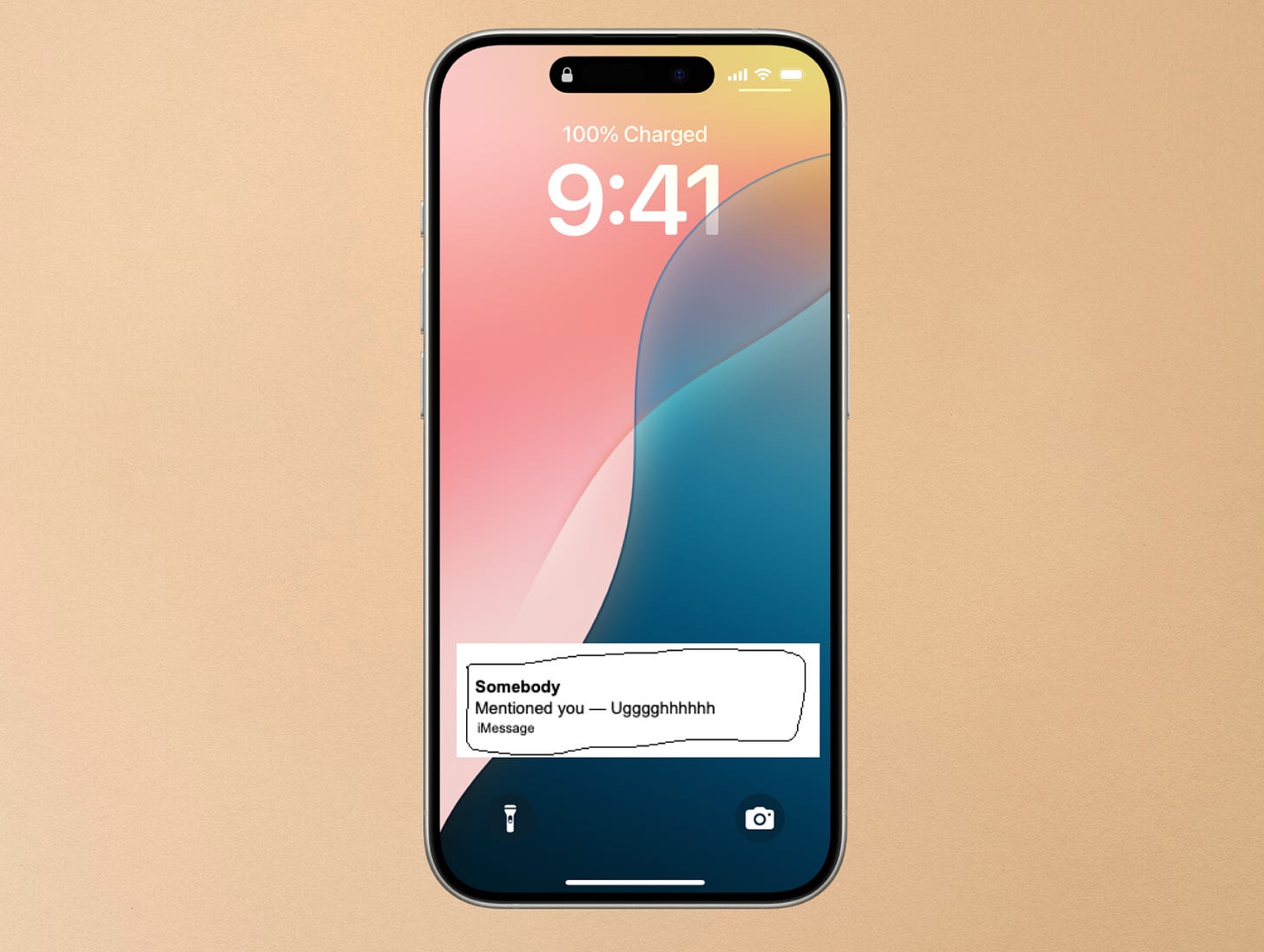In group chats, you must resist the temptation to @
For the good of humanity. For the love of God.
Recent headlines have offered no shortage of proof that group chats can be conduits for harm.
The private messaging threads have been used to indiscriminately share sensitive and classified details about military operations. They’ve been used to shape and strengthen the current alliance between the tech elite and political right. Most chillingly, they’ve been used to spread the rumor that Michelle is sleeping with a billionaire for $1500 a night; information that was allegedly shared to smoke out a chat “mole,” who, I suppose, proved himself to be Danny (a former Nickelodeon actor who recently sexually harassed two lesbians and, unrelatedly, made his beautiful wife move to Santa Clarita as punishment for bearing his children), although it seems that, in truth, information from the unwieldy and frightening “Guy’s Chat” is routinely shared outside of the chat and that, in fact, Jesse likely mentioned the billionaire rumor less to smoke out a potential mole and more simply to smear the mother of his child, with whom he is locked in a divorce battle in which he, a luxury real estate agent, is representing himself.
Yes?
And yet not a single piece of coverage has mentioned the most insidious facet of the group chat. One that haunts not just the chats of the scary, but the chats of the regular. A crime that, indeed, you yourself may have committed:
“@”
Group chats can be divisive. Some people find them annoying, which I understand. It can be annoying to receive communication from people. A lot of the time it’s like what are they even talking about, and also why are they talking about it so much.
Still, I happen to like group chats quite a bit. At their best, they’re a low-pressure way to stay in essentially constant communication with the people you love. They’re annoying at their worst, but in a way you can easily ignore. There’s no pressure to respond. No one is looking at you, no one is waiting on you. You can chime in if you want. You can say whatever. If there’s an awkward silence, it’s not your sole responsibility to fill it. If you caused the awkward silence, you can tell yourself maybe it’s just that nobody is looking at the group chat right now. There is freedom within the group chat. It is painless. It is all perfectly fine. Unless you receive an “@.”
An “@” — which, when followed by a name (@kelly, for example), contacts a chat member directly — breaks the low-pressure social code of the group chat. It provokes the same psychological response as a Microsoft Teams ping. It calls you into the principal’s office. It makes your name blue, for all to see. It says, I don’t care if you are busy or just unable to respond due to the inexplicable stress that sometimes comes from having to answer things like texts and emails. I’m going to attempt to force an immediate interaction. I’m going to call everyone’s attention to you. I’m going to make you get a notification on your phone, even though you have this chat muted. My ability to get a response from you is more important than your peace, which I know you have been working so hard to cultivate, particularly in these tumultuous times.
If you’re an “@”-er, you’re likely thinking: but what if I need someone to see something? What if I need to tell them something right away? And to that I’d ask: do you really? What do you need to tell them? “Hey, look at this.” “Share your opinion on this.” Oh, gosh — you’re right, I can see why that couldn’t wait until they saw the group chat naturally.1
I think if you were going to tell a person something absolutely necessary, you would not use the rather relaxed forum of the group chat and would instead contact them directly. “Kelly, your house is on fire,” you would say in a one-on-one text. “Kelly, stop looking at your phone — you’re about to drive into a truck.” “Kelly, you said something that is going to get you canceled in your newsletter and it’s too late to undo it but you should come up with a plan immediately.” Right? Yes.
You shouldn’t be able to “@” people in group chats, but you can. This sort of thing happens a lot in life. Like, you shouldn’t be able to [PLEASE INSERT SOMETHING THAT WOULD RESONATE WITH YOU SPECIFICALLY. MAYBE SOMETHING LIKE “RECLINE YOUR SEAT ON AN AIRPLANE.” I DON’T PERSONALLY CARE ABOUT THAT EVEN A LITTLE BIT BUT MAYBE YOU DO] either, but you can, and hopefully you don’t. Consider it good practice to resist this temptation, too.
Oh, and if you have “@”-ed me in a group chat and are now wondering if this is about you, well — it is and it isn’t. Certainly you’ve informed my opinion, it would be a lie to say you haven’t. But it’s okay. Really, it doesn’t matter at all. It’s a very small thing. No worries :) haha
I love you,
Kelly
There’s one exception and that’s if you’re delivering the news we’re all hoping to hear right now. If that happens, absolutely you can “@.” You can “@” everybody in the group chat one by one, why not. But I don’t think that’s going to happen anytime soon, mostly because he doesn’t drink. And the list of things you can “@” people about, for me, ends there. So, tough luck.






Somebody had to say it. For the love of dogs, keep it off your Facebook pages and groups too. Or else you'll find people @ the "Unfollow" button.